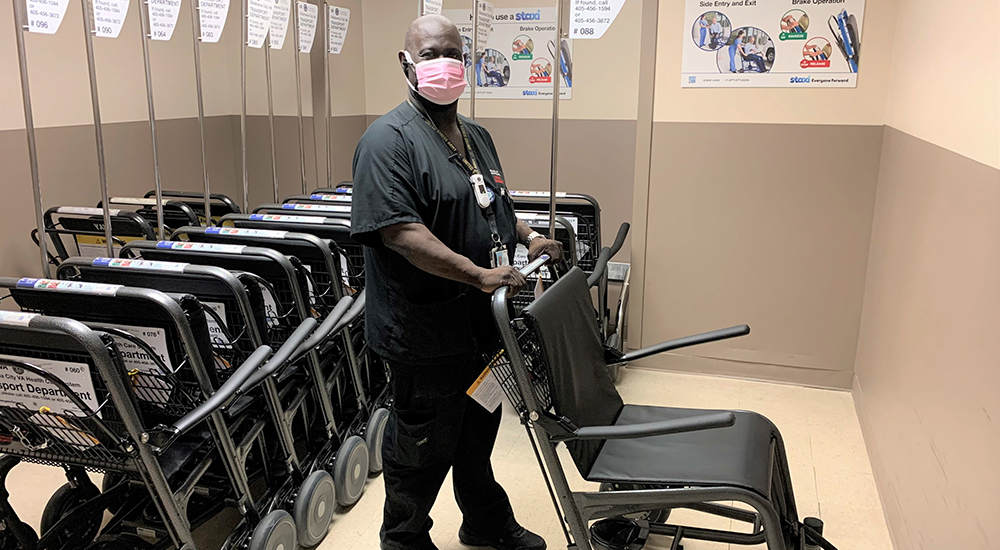The Compensated Work Therapy (CWT) program at the Oklahoma City VA Health Care System helps Veterans get back into the work force while concentrating on their mental health or physical health challenges.
Three graduates of the CWT program are now full-time employees at the Oklahoma City VA. Veterans Bobby Simmons, Randy Hunter and Bryan Trigg were all homeless and dealing with addiction at some point. Through the CWT program and Friendship House, a transitional, recovery-oriented residence, they have a second chance.
During CWT Rehabilitation Week, the Oklahoma City VA paused to honor the more than 1,000 VA CWT vocational rehabilitation counselors, managers and peer support specialists who provide services to more than 63,000 Veterans each year.
Services integrated with clinical care
CWT services are integrated with clinical care to assist Veterans with mental health or physical health challenges, including serious mental illness and Post-traumatic Stress Disorder.
It also helps Veterans with polytrauma and traumatic brain injury, substance use disorder, homelessness and other psychological issues that may interfere with them securing gainful employment.
Army Veteran Simmons (pictured above) now works as a patient observation aide in Oklahoma City VA Transport Services. He says he turned his life around with the help of the CWT Program and the staff of the Friendship House.
“They gave me the tools and the opportunity to get a decent paying job. But you must put one hundred percent of yourself into the program. When I first started, I didn’t think this was going to be for me. But through the program something changed in me.”
Back to work and help with recovery
“We work to have contracts in place in the community to allow our Veterans a real-world opportunity to join a business and become a trusted asset to them,” said CWT Program Coordinator Fawn Jones. “The program is designed to help rehabilitate Veterans back into the work force while participating in their recovery program at our local VA. We address the barriers that are hindering competitive employment.”
Navy Veteran Hunter now works as a cook and inventory control specialist in Nutrition Services. After succumbing to alcoholism and becoming homeless, he found help at the Oklahoma City VA CWT Program and Friendship House. In the CWT Program, his supervisors took notice of his hard work and dedication.
“It made me proud, as I found out later, that supervisors and coworkers stood up and spoke highly of me,” said Hunter. During his time in the CWT program, he realized he could be an asset to VA and someone who could help fellow Veterans.
Partnerships help provide employment
CWT programs are located at VA medical facilities nationwide. They provide vocational rehabilitation services to Veterans. They also develop partnerships with local, regional and national businesses, and industry and government agencies that provide Veteran candidates for employment.
Army Veteran Trigg began working at the Oklahoma City VA less than two years ago as a full-time employee. Originally from California, he found himself homeless and dealing with depression. Trigg contacted the Veteran Crisis Line and received treatment, then enrolled in the CWT Program.
“They are an excellent support group and you can talk to them anytime. They will point you in the right direction, provide needed help and the tools you need to succeed.”
Story and photos by Phillip Ybarra, Public Affairs Specialist, Oklahoma City VA Health Care System.
Topics in this story
More Stories
The Medical Foster Home program offers Veterans an alternative to nursing homes.
Watch the Under Secretary for Health and a panel of experts discuss VA Health Connect tele-emergency care.
The 2024 National Veteran Suicide Prevention Annual Report provides the foundation for VA’s suicide prevention programs and initiatives.








cwt is only for male veterans so unless you can come up some stories about women veterans who have had good luck with cwt, you should stop printing these articles.